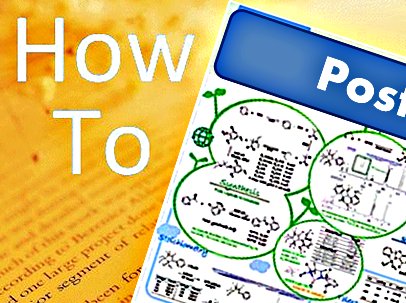Engaging Posters and Presentations
Making scientific posters and presentations engaging for an audience can be a challenge. If your main subject matter is basically a big bunch of data then how on earth do you make an exciting story out of what looks to most people like a jumble of numbers and structures?
Realising that people want to hear your story as well as that of your data can go a long way to helping you make that all-important personal connection to your audience. Therefore, starting with posters and moving on to giving talks, this collection of tips aims to get you thinking about the scientific as well as the human aspects of what really goes on at conferences so that you can get maximum impact from your time in the spotlight.
Among many topics in the coming months, I’ll discuss how to choose and target your content effectively, how to use the typical behaviours of conference-goers to your advantage, and how to present yourself as professionally as you present your content. I’ll also give you some practical tips on things like how to get talking to people at conferences and how to impress poster-prize judges.
Check back here each month for the next instalment of your step-by-step guide to mastering the art of giving scientific presentations
All Articles of the Series
Poster Tips
- Tips for Your Poster: Writing a Conference Abstract (1)
- Tips for Your Poster: Planning Your Poster (2)
- Tips for Your Poster: Designing Your Poster (3)
- Tips for Your Poster: Presenting You and Your Poster (4)
- Talking in Poster Sessions: Breaking the Ice (1)
- Talking in Poster Sessions: After the Icebreaker (2)
- Talking in Poster Sessions: Answering Questions (3)
- Talking in Poster Sessions: Impressing Poster-Prize Judges (4)
All Articles of the Series
Presentations Tips
- Planning Your Slide Show
- Designing Your Slides
- To Script or Not to Script?
- The Main Event – Stepping into the Spotlight
- Taking Questions
- Making it Memorable
|
|
Richard Threlfall, Managing Editor of the Asian Journal of Organic Chemistry, also wrote the very well received series: Tips for Writing Better Science Papers |
All Articles of this Series
Tips for Writing Better Science Papers
- Tips for Writing Better Science Papers: The Cover Letter (1)
- Tips for Writing Better Science Papers: Titles (2)
- Tips for Writing Better Science Papers: Abstract (3)
- Tips for Writing Better Science Papers: Introduction (4)
- Tips for Writing Better Science Papers: Graphics and Tables (5)
- Tips for Writing Better Science Papers: Results and Discussion (6)
- Tips for Writing Better Science Papers: Experimental (7)
- Tips for Writing Better Science Papers: References (8)
- Tips for Writing Better Science Papers: What Happens Next? (9)
- Mind your Language! A Very Brief Guide to Language Usage in Scientific Writing (1)
- Mind your Language! A Very Brief Guide to Language Usage in Scientific Writing (2)
- After Submission and Handling Referee Comments: Manuscript Rejected
- After Submission and Handling Referee Comments: Unfair Review?
- After Submission and Handling Referee Comments: Manuscript Accepted or Revision Requested
- After Acceptance: How to Turn Your Research into Cover Art





